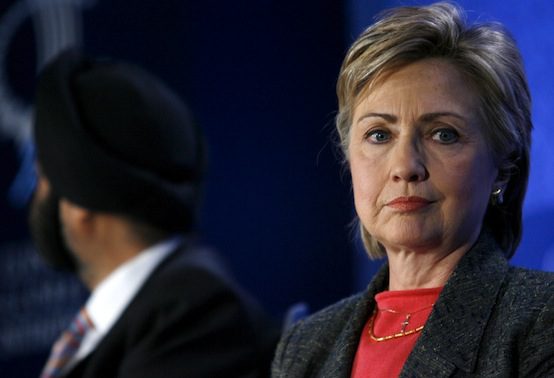Clinton’s Aggressive Foreign Policy

Conor Friedersdorf objects to describing Hillary Clinton’s foreign policy as “muscular”:
But the muscularity of the United States isn’t where Obama and Clinton disagree. They favor the same amount of muscle. Clinton is just more inclined to initiate violence with it [bold mine-DL]. Calling her more militaristic would be more accurate, but that word has negative connotations, so despite its accuracy it is not used by the political press.
I agree with Friedersdorf that “muscular” is a misleading and inaccurate way to describe the views of hawkish politicians, and I’ve addressed that before here:
Hawks would like to get the credit for being “tough” or “strong” in the face of foreign threats, but they don’t want to own the deadly and sometimes disastrous consequences of their preferred policies. They want to be known for favoring U.S. “leadership,” but don’t want to account for the costs when that “leadership” plunges the country into unnecessary conflicts or wrecks entire countries because of reckless action.
As for Clinton, the most neutral way that I can think of to describe Clinton’s foreign policy is aggressive, and her record shows that in almost every debate she will take the side favoring the more aggressive option. One may or may not share her bias for more aggressive measures, but there is no question that this has been the pattern in her foreign policy positions. On Libya, when the choice was between staying out of a foreign civil war or taking sides, she favored taking sides. When the choice was between a more “limited” intervention and the pursuit of regime change, she preferred the latter. Had she been president, it is possible that the U.S. role in Libya would have been much larger than it was, but we can’t be sure of that. Regardless, her preference for aggressive measures leads her to endorse reckless policies. As we see in the Libyan case, she has been just as guilty of the recklessness that she (correctly) attributes to Republican hawks, but because she can count on other hawks to be even more reckless she is able to present herself as a more “responsible” alternative.
Even so, she doesn’t shy away from publicly endorsing military options in explicit terms. As she said at Brookings yesterday, she will “not hesitate to take military action” against Iran if it tries to acquire a nuclear weapon. This is close to the boilerplate rhetoric of saying “all options are on the table,” but Clinton adds extra emphasis to her support for starting what would be an illegal and unnecessary war. Not only would she start such a war, she would do it without hesitation. Unlike Obama, she isn’t going to feign reluctance before starting a new war, and there probably isn’t going to be any long process of deliberation beforehand. Clinton’s message was for the Democratic hawks that believe Obama is too reluctant and too hesitant to order the use of force. Since Obama has launched two illegal wars and ordered many more strikes over the years, this is a bizarre complaint to make, but it is a common one. Clinton is reassuring the hawks in her party and in D.C. generally that she will be much more hasty to resort to force than Obama has been, and based on her record we can believe that she would.
Comments